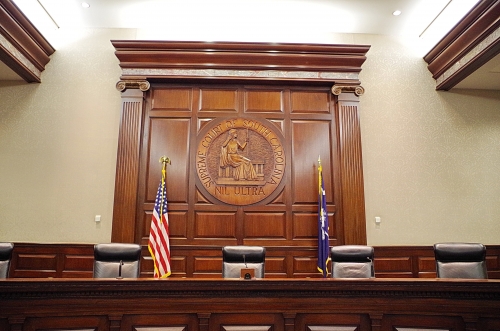Judicial Reform on the Horizon: Comparing the House and Senate’s Proposals
Download this legislative analysis.
It is the spring of judicial reform in the South Carolina Statehouse.
House and Senate members, both Republican and Democrat, can agree on the need for reform. The fact that consensus exists at all is a significant step forward, and it’s all due to the fact that the last year has seen an increase in public demand for changes to how South Carolina selects judges, with vocal support from the Governor and the Attorney General. South Carolinians want to weed out cronyism, stamp out back room dealing, and reduce potential conflicts of interest in the judicial selection process.
While most legislators can agree that broad changes are needed, consensus tends to fall apart when it comes to the details. In each chamber, a plethora of judicial bills have been filed, and leadership has attempted to consolidate those proposals into lengthy master bills.
The House’s Ad Hoc Committee to Examine the Judicial Selection and Retention Process, after an extensive public testimony and drafting process that we reported on earlier this year, produced H.5170, which received a subcommittee hearing on March 7 and is likely to make it to the floor in the coming weeks.
The Senate, after a series of Judiciary Committee meetings, combined 16+ bills into their own master bill, S.1046. That bill was set for Special Order on February 28, and after a “working group” delivered its compromise amendment, S.1046 passed the Senate on March 14.
So just what can the General Assembly agree on?
- Judicial reform is necessary this year.
- Public confidence in the state’s judiciary branch is wavering, and action needs to be taken to restore their trust in the impartiality of the court system.
- Changes should not, at this point, be made by amending the SC Constitution; impactful reform can be accomplished simply through modifying the SC Code of Laws, all under the broader guidance of the Constitution.
- South Carolina’s system of judicial elections through the General Assembly, while unique, is a good system that produces many extraordinary and honorable members of the bench.
- The Judicial Merit Selection Commission (JMSC) is an effective screening tool but needs reform to reduce cronyism and the outsized influence of lawyer-legislators.
- The Executive Branch needs to play a greater role in the judicial selection process.
The two master bills, H.5170 and S.1046, have many similarities and tackle largely the same problems that have been raised about the current system. Yet, they have some key differences. This legislative analysis compares and contrasts these two major bills, in light of Palmetto Promise’s previous positions on judicial reform, most notably our January 2021 Judging the Judges report.
To read Palmetto Promise’s previous reports on judicial reform, please visit our landing page: palmettopromise.org/judicialreform
JMSC MEMBERSHIP
As a refresher, here is how the JMSC is currently appointed:
- 5 members appointed by the Speaker of the House (3 must be General Assembly members and 2 must be from the general public)
- 3 members appointed by the Chairman of the Senate Judiciary Committee (must be members of the Senate)
- 2 members appointed by the President of the Senate, must be from the general public
H.5170: Increases JMSC to 13 members.
- 4 members appointed by the Speaker of the House (2 must be Representatives, 2 must be SC Bar members with 10+ years of experience).
- 2 members appointed by the Senate President (1 must be a Senator, 1 must be a SC Bar member with 10+ years of experience).
- 2 members appointed by the chairman of the Senate Judiciary Committee (1 must be a Senator, 1 must be a SC Bar member with 10+ years of experience).
- 5 members appointed by the Governor (1 must be a retired state judge, and the remaining 4 must be SC Bar members with 10+ years of experience).
- Prohibits elected officials from appointing campaign donors to the JMSC.
S.1046: Increases JMSC to 12 members.
- 4 members appointed by the Speaker of the House.
- 2 members appointed by the Senate President.
- 2 members appointed by the Chairman of the Senate Judiciary Committee.
- 4 members appointed by the Governor (1 must be an experienced criminal lawyer, 1 must be an experienced civil lawyer, 1 must be an experienced family lawyer, and 1 must be a retired judge from the SC Supreme Court, Court of Appeals, Circuit Court, or Family Court).
- All 8 legislatively-appointed members may be members of the General Assembly, and none are required to be members of the general public.
- Legislatively-appointed members may be removed for incapacity, misconduct, or neglect of duty with a majority vote in their respective chamber, via a removal resolution that’s proposed by at least 10 members.
Palmetto Promise called for changes to the JMSC composition in Judging the Judges Recommended Reform #2. We support limiting legislative appointments and the number of lawyer-legislators serving on the JMSC and adding more appointments by the Governor and other stakeholders.
JMSC TERM LIMITS
Terms for JMSC currently
- For members of the public: 4 year terms.
- For members of the General Assembly: until the end of their term in office.
H.5170:
- 2 year terms. Can serve no more than 2 consecutive terms.
- Staggers the terms of members so half the Commission’s terms end each year.
S.1046:
- 4 year terms. Can serve multiple terms, but a member must rotate off the JMSC for at least 4 years before reappointment.
- Staggers the terms of members, so every two years, half the JMSC will be reappointed.
These term limit suggestions are right in line with what Palmetto Promise proposed in Judging the Judges Recommended Reform #3. We firmly believe that no JMSC member should screen a judicial candidate for both his initial appointment and reappointment.
SCREENING
H.5170:
- Combines the redundant screening process of the SC Bar and the Citizens Review Committee into the Bar and Citizens’ Judicial Qualifications Committee, which will conduct electronic surveys to assess judicial candidates’ qualifications, both when they are running for office and as a midterm review of all sitting judges.
- Removes the requirement that JMSC must destroy all materials about candidates. Instead, JMSC must retain all materials about judicial candidates, even after they withdraw from the race.
- Adds to the existing requirement that the JMSC screen for candidates’ “character,” to clarify that it is “pursuant to the canons of judicial conduct and legal ethics.”
- Requires that all judicial candidates must disclose any sanctions, including private reprimands, to the JMSC as part of their screening process.
- Removes the option for the JMSC to exempt candidates from a public hearing as part of the screening process.
- Authorizes the JMSC to craft regulations for livestreaming proceedings.
S.1046:
- If a family member of a JMSC member runs for a judicial office, that JMSC member must resign his or her seat.
- Allows the JMSC to use anonymous surveys in the screening process.
- Removes the option for the JMSC to exempt candidates from a public hearing as part of the screening process.
- Requires the JMSC to livestream meetings.
- Requires the JMSC’s report on candidates’ qualifications also includes why any candidates were not found qualified, so the reasons for their rejection are on the record and publicly available.
Palmetto Promise is pleased to see the House bill incorporate a mid-term review of judges and the required disclosure of any disciplinary actions against judges when they are up for reelection. These, along with any other complaints, should also be reported to the General Assembly should a judicial candidate advance for a vote (see Judging the Judges Problem #7 and Recommended Reform #4).
We would also like to see the Citizens Committee (or, under the House bill, the Bar and Citizens’ Judicial Qualifications Committee) reformed to be more independent from the JMSC, as we noted in Judging the Judges Problem #6. To be impartial, members of this committee should not be appointed by the JMSC itself.
More transparency in the JMSC process is needed, and we support livestreaming meetings and on-the-record explanations for why any candidates were found unqualified.
ADVANCING CANDIDATES
Currently, the JMSC selects at most 3 candidates to advance to the General Assembly for each judicial seat, even though more than 3 may be deemed qualified.
H.5170: Removes the cap. All qualified candidates should be advanced, and reports on candidates’ qualifications should be released on the first day of the legislative session.
S.1046: Raises the cap to 6 candidates for each judicial seat. Also allows candidates to run for multiple seats.
In Judging the Judges Problem #3 and Recommended Reform #1, Palmetto Promise called for the advancement of all, or at least more, qualified candidates for each seat.
WITHDRAWAL
H.5170:
- Candidates may withdraw at any point in the process, but, after public hearing begins, the JMSC must retain all materials concerning the candidate even after his withdrawal.
S.1046:
- Candidates may withdraw at any time prior to their public hearing or after the JMSC releases its draft report to the General Assembly.
These changes to candidate withdrawal come in response to recent legislative horse-trading in judicial races (a concern we raised in Judging the Judges Problem #4), where behind-the-scenes dealings have seemingly forced candidates to withdraw in the middle of the process.
CAMPAIGNING
H.5170:
- The JMSC’s nominations and full report on qualified candidates must be released on the first day of the legislative session.
- Time between the JMSC’s nominations to the General Assembly and the General Assembly’s election: between 4 and 8 weeks, rather than the current 2 weeks.
- Judicial candidates may not directly or indirectly campaign until one week before the election.
- Removes the loophole that allows judicial candidates to ask legislators to campaign on their behalf outside the campaigning period.
- Allows JMSC to adopt additional rules about judicial campaigning and ethics.
S.1046:
- Time between the JMSC’s initial nominations (“draft report”) to the General Assembly and their formal report on candidate qualifications: 12 days, rather than the current 48 hours.
- Time between the JMSC’s formal report on qualifications and the General Assembly’s judicial election day: 22 days, again rather than the current 2 weeks.
- Prohibits any “person” (rather than just “candidate”) from seeking pledges of support from legislators before the JMSC’s formal report, so no judicial candidate can campaign before they are officially in the running.
- Bans legislators from acting as “vote counters” for judicial candidates or help promote candidates prior to the JMSC’s formal report.
- Cracks down on horse-trading, so legislators cannot offer votes for other judicial candidates “now or in the future” to convince a candidate to withdraw.
Palmetto Promise supports the establishment of clearer campaign rules for judicial candidates. We prefer that these bills would include provisions for General Assembly members to question candidates on the record, potentially using the House and Senate Judiciary Committees to help screen candidates, like we proposed in Judging the Judges Recommended Reforms #5 and #6.
VOTING PROCEDURE
H.5170:
- Candidates must secure a majority of the vote of the General Assembly in joint session.
- To narrow the field of candidates, after each balloting, the candidate with the fewest votes must be eliminated for the next ballot until one candidate remains and is thus elected.
S.1046:
- Candidates must secure a majority of the vote of members in each legislative chamber, rather than a majority in joint session (Palmetto Promise called for this change in Judging the Judges Recommended Reform #7).
- If no candidate receives the necessary majorities in the first vote, a subsequent vote will be held with the top three vote-getting candidates.
- If no candidate receives the necessary majorities in the second vote, legislators will “carry over” the election, and come back one week later to complete the elections with those same three candidates in the race. This is an interesting procedure.
LIMITS ON LAWYER-LEGISLATORS
H.5170:
- Members of the General Assembly must be one year out of office before seeking a judicial seat (same as current law).
- Establishes the JMSC as a standalone, independent state office, with a staff and location separate from the General Assembly and its own executive director who works exclusively for JMSC.
S.1046:
- Members of the General Assembly must be two years out of office before seeking a judicial seat.
- No member of the General Assembly may vote for or ask for votes for a judicial candidate that is a family member.
In Judging the Judges Recommended Reform #2, Palmetto Promise called for crackdowns on lawyer-legislators’ outsized power in the process and potential corruption in judicial appointment, calling for rules “prevent[ing] family members of members of the General Assembly from being elected to judgeships.”
MAGISTRATE REFORM
Palmetto Promise published a thorough critique of the existing magistrate system back in 2021. These issues include a lack of legal training for magistrates, an appointment process that is ripe for corruption, and indefinite service on the bench in “holdover” capacity.
H.5170:
- Increases magistrates’ jurisdiction from a maximum of $7,500 to $25,000 to address court backlog, and subsequently increases the maximum criminal sentences magistrates can order.
- Creates the Magistrates Review Subcommittee composed of 9 members, 5 appointed by the Governor and 4 appointed by the Senate President.
- This committee would review magistrate candidates recommended by the Senate before they are officially appointed by the Governor. The committee will forward a report on magistrates’ qualifications to the Senate and Governor before the Governor’s appointment.
- Limits magistrates’ ability to serve past the end of their term in “holdover” status to 14 days. The Governor may make a temporary appointment to fill this spot if needed.
- Requires that magistrates reprimanded by the Supreme Court or other disciplinary authorities may not be reappointed unless the Senate is informed of the disciplinary action and the magistrate is then approved for reappointment by a majority of the Senate.
S.1046:
- The Governor is given recommendations for magistrate judges by a weighted vote of the full legislative delegation of the county in which the magistrate will serve.
Magistrate reform is urgently needed. These bills both provide a good start to those reforms, addressing many of the issues we have raised regarding limiting holdover status, disclosing magistrates’ disciplinary records, and bringing the House of Representatives into the magistrate process. However, in our opinion, these two bills do not go far enough on their own. Increasing magistrates’ jurisdiction only highlights the need for greater legal training requirements for magistrate judges. Additionally, safeguards are needed against lawmakers’ family members being appointed magistrates, and it is only right that Senators be required to vote on the record for magistrate judges.
MASTERS-IN-EQUITY JUDGES
H.5170: Allows legislative delegations to reject a masters-in-equity candidate (in light of recent controversy).
S.1046: No changes to masters-in-equity judicial selection.
This is a fairly recent issue that has arisen in the state, and we support the House’s proposed changes.
Examining each body’s master judicial reform bill, it is clear that there are fairly significant differences between the two proposals. The House’s bill is overall much more extensive and advances broader reforms than the Senate bill, likely a result of the thorough public testimony process conducted by the House’s Ad Hoc committee.
That said, both omnibus bills proposed thoughtful and often creative methods to address concerns about potential corruption and inefficiency in the judicial appointment process. Palmetto Promise Institute is pleased to see judicial reform in the spotlight this spring, and we hope the two chambers will be able to reach agreement on a reform bill that addresses the concerns raised in our 2021 Judging the Judges report and additional concerns outlined here.





